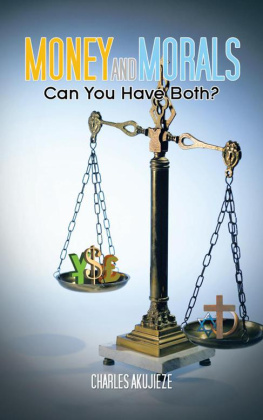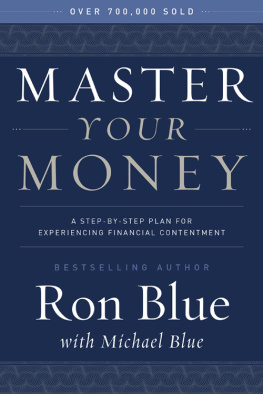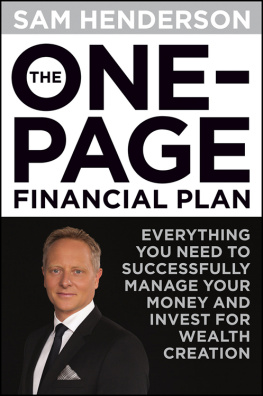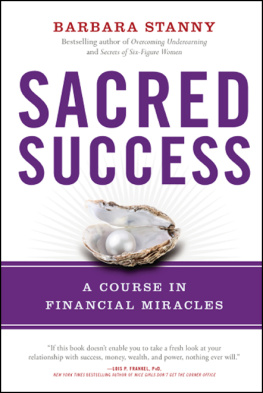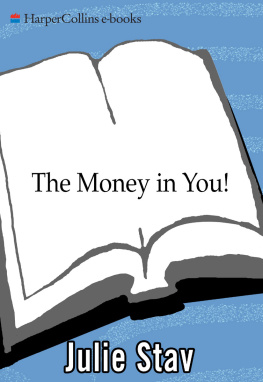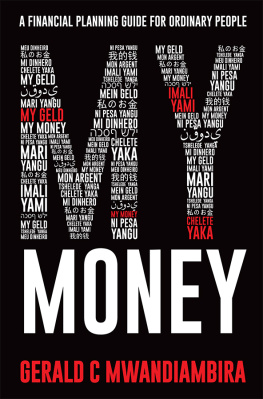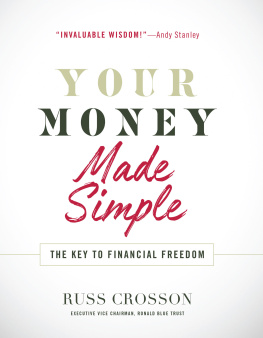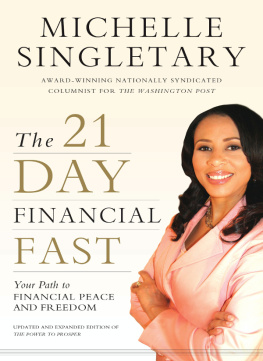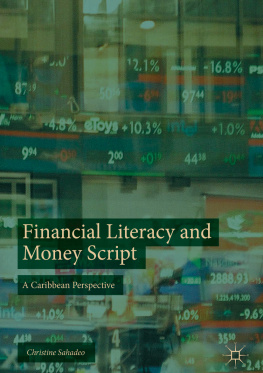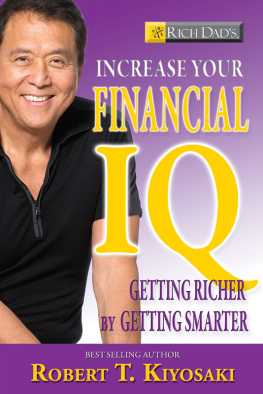MONEY AND
MORALS
Can You Have Both?
CHARLES AKUJIEZE
Dip., B.A. (Hons), M.Sc. (Hons), AMNIM

AuthorHouse
1663 Liberty Drive
Bloomington, IN 47403
www.authorhouse.com
Phone: 1-800-839-8640
2013 by Charles Akujieze. All rights reserved.
No part of this book may be reproduced, stored in a retrieval system, or transmitted by any means without the written permission of the author.
Published by AuthorHouse 03/12/2013
ISBN: 978-1-4817-8591-4 (sc)
ISBN: 978-1-4817-8592-1 (e)
Any people depicted in stock imagery provided by Thinkstock are models,
and such images are being used for illustrative purposes only.
Certain stock imagery Thinkstock.
Because of the dynamic nature of the Internet, any web addresses or links contained in this book may have changed since publication and may no longer be valid. The views expressed in this work are solely those of the author and do not necessarily reflect the views of the publisher, and the publisher hereby disclaims any responsibility for them.
TABLE OF CONTENTS
CHAPTER ONE
Money And Morals (An Awkward Balancing Act?)
CHAPTER TWO
Why Are People Poor?
CHAPTER THREE
The Power To Make Wealth
CHAPTER FOUR
Understanding The Covenant And How It Works
CHAPTER FIVE
Vehicles Of Wealth Creation
CHAPTER SIX
Developing Investment Mentality
CHAPTER SEVEN
Journey To Financial Freedom And Independence
CHAPTER EIGHT
Multi-Dimensional Sources Of Income
CHAPTER NINE
Activating Generational Blessing
Our society is perverse and permissive. Our society is morally sick and it stinks. Our desire for money, our crave for wealth is increasingly insatiable. We are no longer satisfied with our wages. We are living a false lifestyle in a vain societya society where morons are barons, a society where thieves are chiefs, a society where monkey de work, baboon de chop.
Nothing agitates the mind of the natural man these days more than wealth. Money is indeed the necessary evil which no one can actually do away with because every activity is programmed around it. Money is a defense. It is a protection against problems associated with poverty. It gives one a voice. It is, at best, a means whereby we have our ends met. It is a medium of exchange. It is through it, with it and in it that most of our desires are satisfied.
On the other hand, morality has to do with the principles concerning right and wrong or good and bad behavior. Morality in turn is grounded in values and ethics. Values are expressions of preference, with some distinct moral overtone. It is all about ideas people have about what is good, desirable and important. They may be inferred from actual behavior of people in particular situation, or they may be stated directly in words. It could also be seen as conceptions, explicit or implicit, distinctive of an individual or characteristic of a group of the desirable which influence the selection from available mode, means and ends. The values that guides a mans action and influence his decision making is therefore fundamental and deeply rooted. When translated into action, values can and do have a significant and sometimes critical impact on the nature and quality of our physical, psychological and social life. In short, values are real because they have real consequences. On the other side of the coin, ethics has to do with the question of what is right and good, and what is wrong and evil in human conduct. It concerns itself with judgments of approval and disapproval, judgments as to rightness or wrongness, goodness or badness, virtue or vice, desirability or undesirability, wisdom of actions, dispositions ends, objects or states of affairs. The primary concepts are ought, obligation, duty, right wrong, etc. The central question of ethics includes: how ought men behave? What is good? What determines the morality or immorality of actions?
It is therefore, germane and fundamental to observe the great difference between generally accepted ethical premises and day-to-day behavior of men (and women) which reveal their operating values. The behavior of individuals has certain inescapable normative components in the performance of their duties.
The relevance of the above to our central theme stems from the fact that every man is already a product of a worldview which he wears as a spectacle through which he perceives money and its acquisition. It is then a fact of life that every man pursues money with an element of bias. It is therefore in this important sense that one argues that every man (and woman) access money from a point of view or bias, a guidance or foreknowledge which influences his desire, love or lust for money. Many see it as an end in itself whilst a few rightly see it as only a means.
The love and crave for money has laid down many pathwaysdrug trafficking, terrorism, human trafficking, armed robbery, bribery and corruption, prostitution, money making rituals, varieties of stealing, dishonest practices, dubious businesses etc. There is no evil that has a name that people do not commit in their quest to make money. We know what the problems these vices inflict on the society and yet we seem to be jinxed not to do much about them. It is as if we are cursed to bungle things more and more. But are we to keep on bungling things over as if we were villains by necessity and fools by heavenly compulsion?
Now, let us reason together: Is it really practical to be honest these days? Is honesty in our work or business a relic of the past? Are those who try to practice honesty doomed to failure? The pressure to be dishonest is indeed great. Consequently, those who try to be honest are subjected to intense pressure in many areas.
One of such areas is personal temptation. Who amongst us would not enjoy having more money or some additional luxuries? When presented with an opportunity for dishonest financial gain, how many of us can really resist?
There is this pressure to maximize profits. In recent years, businesses worldwide have struggled with poor economic conditions. They must also cope with rapidly changing technology and increased regional and global competition. Employees may feel that resorting to dishonesty is the only way to meet performance goals set by owners and managers.
Pressure from others present another challenge. Co-workers, or customers may at times suggest, or even demand, that you join them in dishonest schemes.
In some cultures, it is customary for business transactions to be accompanied by an exchange of gifts. Depending on the size and circumstances of the gift, the boundaries of honest business practices can easily become blurred. In many lands, corrupt officials demand money before performing their duties and willingly accept payment in exchange for special treatment.
Those who live in severe poverty or in countries where there has been a breakdown in civil order face the greatest pressure of all. In such environments, those who are unwilling to cheat or steal may be viewed as poor providers for their families.
To say that honesty has broken down in our time is so obvious even for the blind to see. Explaining vividly how honesty has a profound effect, a religious journal, Awake!, in its publication of January 2012, reveals that a survey of business managers in Australia reported that 9 out of 10 considered bribery and corruption to be wrong but unavoidable. According to the journal, those surveyed said they would be willing to ignore their morals to win a contract or benefit their company.
Accordingly, people often shortchange themselves as they present themselves as honest while they are really the opposite. However their self-image and their actual behaviors are irreconcilable. In this vein, Journal of Marketing Research complains: People behave dishonestly enough to profit but honestly enough to delude themselves of their own integrity. This results inexorably to people excusing, minimizing, or even justifying dishonesty in different ways just to ease their internal struggle.
Next page
